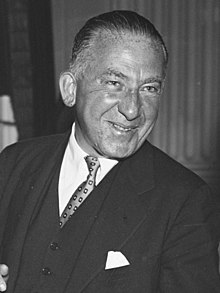Ernest Gruening | |
|---|---|
 Gruening in 1935 | |
| United States Senator from Alaska | |
| In office January 3, 1959 – January 3, 1969 | |
| Preceded by | Himself (Shadow Senator) |
| Succeeded by | Mike Gravel |
| United States Shadow Senator from the Alaska Territory | |
| In office October 6, 1956 – January 3, 1959 | |
| Preceded by | Seat established |
| Succeeded by | Himself (U.S. Senator) |
| 7th Governor of Alaska Territory | |
| In office December 6, 1939 – April 10, 1953 | |
| Lieutenant | Bob Bartlett |
| Preceded by | John Troy |
| Succeeded by | Frank Heintzleman |
| Personal details | |
| Born | Ernest Henry Gruening February 6, 1887 New York City, New York, U.S. |
| Died | June 26, 1974 (aged 87) Washington, D.C., U.S. |
| Political party | Democratic |
| Spouse | Dorothy Smith |
| Children | 3 |
| Education | Harvard University (BS, MD) |
| Military service | |
| Branch/service | United States Army |
| Years of service | 1917–1918 |
| Unit | Field Artillery Corps |
| Battles/wars | World War I |
Ernest Henry Gruening (/ˈɡriːnɪŋ/ GREEN-ing; February 6, 1887 – June 26, 1974) was an American journalist and politician. A member of the Democratic Party, Gruening was the governor of the Alaska Territory from 1939 until 1953, and a United States Senator from Alaska from 1959 until 1969.
Born in New York City, Gruening pursued a career in journalism after graduating from Harvard Medical School. After working for various newspapers in New York and Boston, he served in various roles during the administration of President Franklin D. Roosevelt. He was appointed as Governor of Alaska in 1939 and became a prominent advocate of Alaska statehood.
Gruening became one of Alaska's inaugural pair of senators, along with Bob Bartlett, after Alaska gained statehood in 1959. Gruening was a prominent opponent of the Vietnam War, and with Oregon's Wayne Morse, was one of just two senators to vote against the Gulf of Tonkin Resolution which allowed the bombing of North Vietnam. In 1968, Mike Gravel defeated Gruening in the Democratic Senate primary, and Gruening's attempt to win re-election as an independent was unsuccessful.